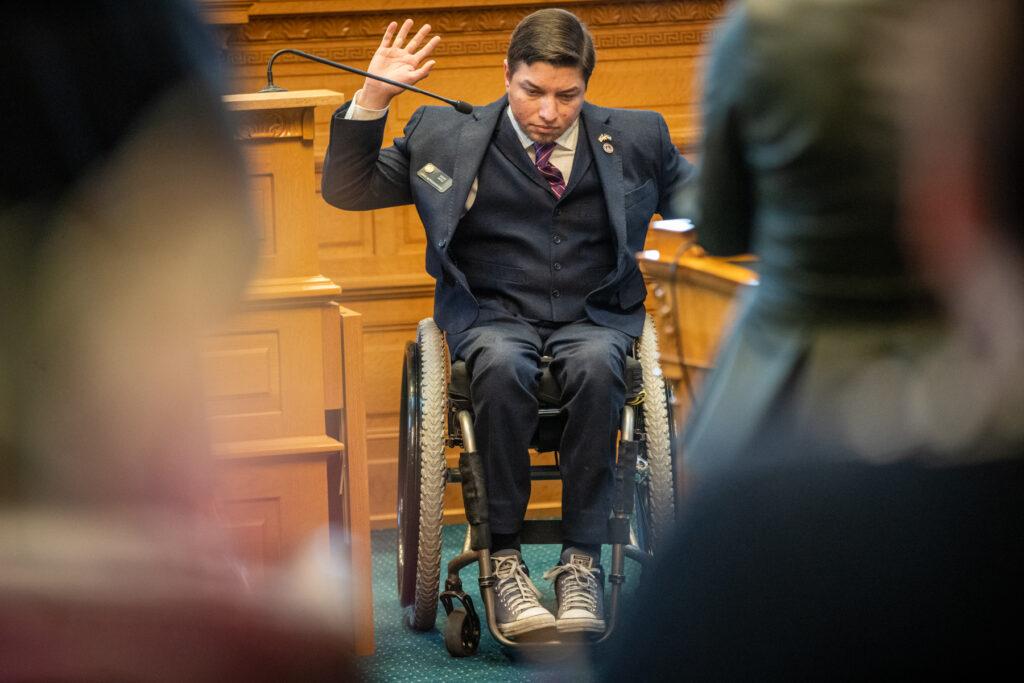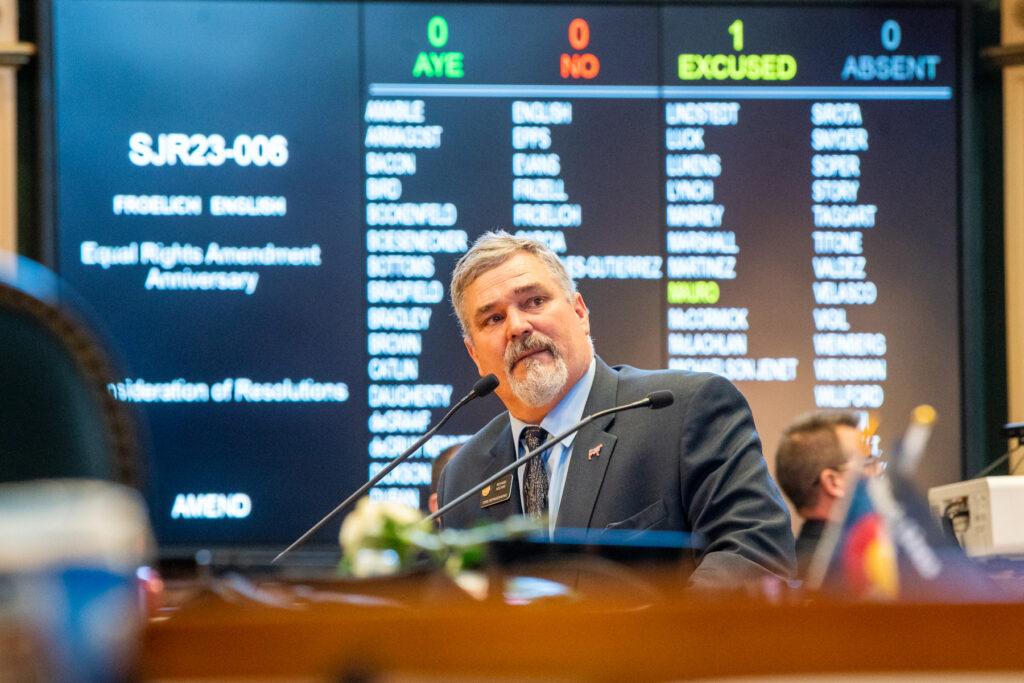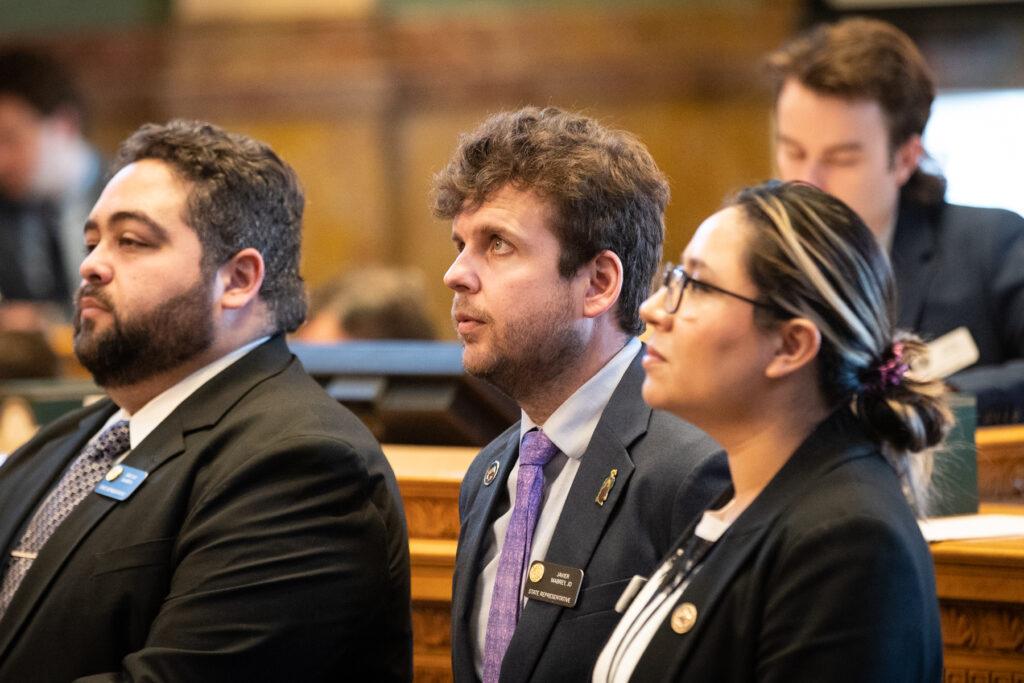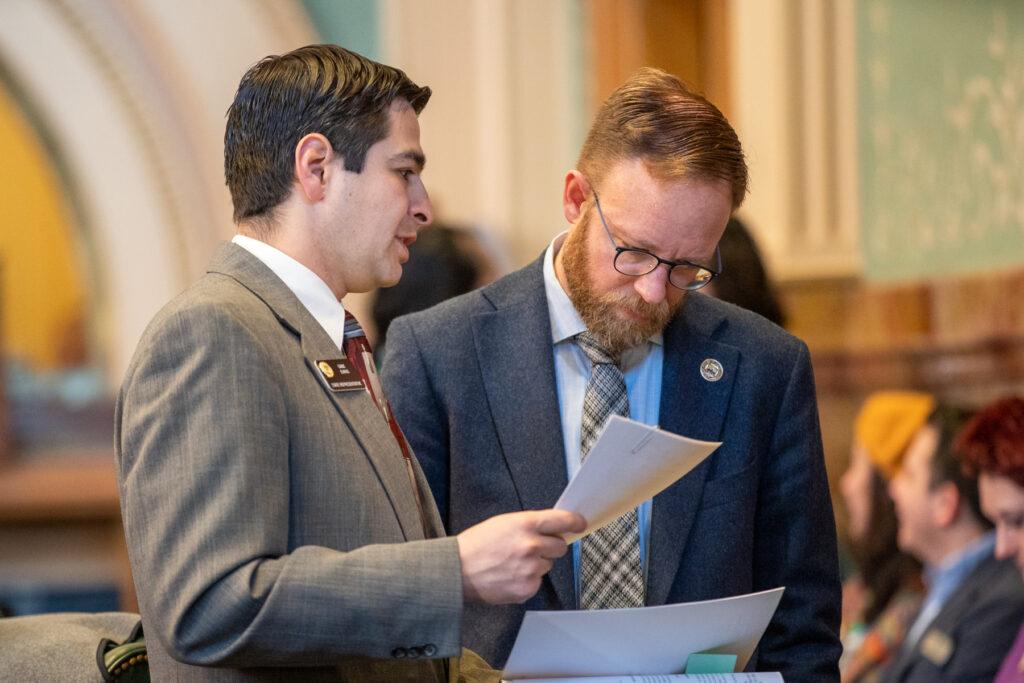
Colorado lawmakers spent this weekend at their respective homes — and not at the state Capitol. Normally, that wouldn’t be headline news, since the legislature almost always takes off the long weekend between Good Friday and Easter Sunday.
But that tradition was nearly broken by the House this year, a sign of rising tension and changing norms at the state legislature.
“I thought we were going to be working,” said state Rep. Serena Gonzales-Gutierrez, a Democrat, on Friday afternoon.
She was pleasantly surprised to ultimately get the holiday off: “I think I missed the announcement that we weren’t working.”
As Democrats have advanced a series of major bills, Republican lawmakers have responded with days-long debates, slowing the overall work of the legislature.
Debates over supervised use sites for drug users, stricter gun laws and expanded access to abortion and gender-affirming care have stretched well past midnight and across weekends. In response, Democrats have used rarely invoked powers to wrap things up and keep their bills moving forward.
Ahead of the Easter weekend, which also coincided with Passover, it appeared that the partisan fight could escalate — with a handful of House Republicans threatening to further slow the work of the chamber, and Democrats countering that they would stay in session over the holiday weekend if necessary to keep legislation on schedule.
“Our caucus was ready to work today, tomorrow, Sunday if we needed to,” said House Majority Leader Monica Duran, a Democrat, in an interview on Good Friday. “Don’t plan your weekends. Plan to work.”
The standoff played out as the chamber tried to get through the state budget, the only piece of legislation they are required by law to pass each year.
Ultimately the two parties agreed to a compromise, averting a further breakdown and a weekend of work. Duran described it as a positive development based on communication between the parties.
“The most important thing was really listening to each other,” Duran said.
But the frayed relations of recent weeks may point to a deeper change in the state House.
An emboldened Democratic supermajority is pushing forward sweeping legislative proposals, with less patience for Republicans’ delay tactics. Meanwhile, a deeply disempowered GOP caucus is struggling to agree on a response — with several lawmakers wanting to abandon the longstanding minority strategy of negotiation and compromise.
“I hope that this continues,” Democratic state Rep. David Ortiz said of the recent improvement in working relations. “But I’m not holding my breath.”

Republicans split on strategy
The GOP has been out of power since 2018, when it lost control of the state Senate. And that decline accelerated precipitously with the 2022 election, which left the party with their smallest minority in state history.
But Republicans still have one thing on their side: time.
The legislative process in Colorado allows for unlimited debate the first time a chamber considers a bill. At that step in the process, opponents can filibuster, taking turns to talk endlessly about the legislation and delaying a vote for several hours, or even overnight.
Outside of a bill-specific filibuster, Republicans can also eat up hours upon hours by asking for bills to be read at length.
Delays can have two purposes. Republicans might use them to simply express their opposition to Democratic policies. But they also use delays to negotiate for changes to bills or try to defeat them altogether.
There are only 120 days in a legislative session, so Democrats have an incentive to compromise, in exchange for Republicans agreeing not to eat up too much time with floor speeches and bill readings.
“With the numbers we have, we have to use every tool that we've got in there,” said state Rep. Mike Lynch, the House Minority Leader. When Republicans take up time by having a bill read at length, he said, “we're actually doing some negotiation … The ultimate thing is we stop because we’ve come up to an agreement and we get the voices of our constituents heard in that bill.”
But this year, Republicans have disagreed on how to use that approach. Negotiations between the parties have fallen apart at times, as some House Republicans have refused to accept the terms of deals that others were ready to accept.
Republican state Rep. Richard Holtorf said that it’s normal for a party to deal with these internal divisions.
“We have a very independent caucus,” he said. “In large part, we are aligned in getting consensus and compromise. There oftentimes are a few outliers that have a different agenda. And we have to accept that, just as the other side has that same challenge."

Gun bills and the ‘nuclear option’
That schism was on display during the House’s recent debate over a package of gun-reform bills. Republicans spoke for hours on the measures, stretching through a Friday and Saturday. Behind the scenes, leaders from both parties were negotiating over several amendments, including on a bill that would make it easier to sue the firearms industry.
For example, Democrats offered to exempt manufacturers of certain accessories, something that Republicans had been asking for.
“They were good amendments,” said Republican state Rep. Matt Soper, who was tracking the negotiations throughout the weekend. “There was the nod that that’s how we were gonna proceed.”
But when the Republican caucus got together to discuss the final deal on Saturday evening, several of the most conservative members balked, deciding instead to “blow up the bill,” according to Soper.
For that faction of the party — which includes about five members — the small changes weren’t worth dropping their overall objections to the bill. The hardliners are generally from deep-red counties and are in their first or second term in the House.
“The ‘compromise to victory’ strategy, I don't think is a strategy. I think it's just compromise,” freshman Republican state Rep. Ken DeGraaf of Colorado Springs said in an interview later. “The only way to satisfy [my concerns] would be to kill the bill entirely, as far as the constitutionality part.”
Democratic state Rep. Javier Mabrey, a sponsor of the firearm liability bill, watched the deal fall apart from the other side of the aisle.
“It felt like we were negotiating in good faith with some members of the Republican caucus. But then, as that weekend dragged on, it became increasingly clear that the people we were negotiating with weren’t in control,” he said.
A spokesman for Lynch described the situation differently, saying that, while there were negotiations, Democrats never offered enough to cement a deal, nor did they give Republicans enough time or forewarning to fully consider their final offer.
The result was that on Saturday, as the day grew late, Democrats turned to the so-called “nuclear option” — the chamber’s Rule 14. The rule, which takes only a simple majority to invoke, allowed Democrats to end the debate after just one more hour. It’s been on the books since the 1800s but has only rarely been used.
Using the rule allowed Democrats to pass the weekend’s slate of proposals. (Republicans eventually claimed a measure of victory, though: A conference committee later amended the liability bill, removing many of the specific new obligations that it created for the industry and instead saying that the industry must simply follow existing laws about consumer protections and firearm sales.)
In the bigger picture, Republicans have said the use of Rule 14 amounts to censorship of the minority and their constituents. Democrats contend that Republicans have still been allowed long hours to make their points, and that it was the minority of representatives that was obstructing the desire of Colorado voters.
Asked when the debate would have ended without Rule 14, DeGraaf acknowledged he and others may have kept the debate going for days — though they would have run out of steam, he said. He insisted that he and other Republicans were not just wasting time, but instead raising important points.
“We would've gone through and continued to present our case to the people of Colorado, to the record,” he said. “If we don't present that information, it's on us now.”

‘Voters expect results’
It only takes a few lawmakers — and sometimes even just a lone holdout — to disrupt negotiations between the parties. One person can consume hours of a chamber’s time by requesting that a bill be read in its entirety, or hold the well as long as they can keep speaking.
Some of the hardest line members say they’ve been motivated by their religious faith on topics like abortion, or by their absolute faith in the Second Amendment — making the Democratic proposals fundamentally unacceptable.
“I'm one of those strange guys that think God sent me here to do this,” said state Rep. Scott Bottoms, a pastor from Colorado Springs. The party’s right-wing also makes up a greater proportion of the caucus, since Democrats have defeated ranks of moderate Republicans from the suburbs around Denver.
State Rep. DeGraaf said agreeing to compromises on Democratic bills moves Colorado closer to becoming a “Hegelian hell state.”
After Rule 14 was invoked in the gun debate, Bottoms accused Democrats of acting like fascists and said that it “hurt their souls” to hear light and truth. Those remarks drew a rebuke from House Democratic leadership.
Republicans have suggested a seemingly simple solution if Democrats are tired of the long debates: the majority could just run fewer bills on controversial topics. But Democrats reject that idea, saying that they have a mandate for action after winning historic gains in the legislature.
“There’s a reason that Congress has been historically unpopular for the last 30 to 40 years, and that’s because gridlock is not popular. Voters expect results,” state Rep. Mabrey said, adding he believes Coloradans elected Democrats specifically to act on guns, abortion and more.
McCluskie, the Democratic House Speaker, said that the decision to limit debate came with a “heavy heart,” but was ultimately necessary to move the chamber beyond an impasse.
“The debate didn’t feel authentic. It didn’t feel productive,” she said. “I don’t think (that) is good for the chamber. I certainly don't think it's good for the process. I don't think it honors what the process is designed to help accomplish.”

What’s next?
The question hanging over the rest of the session is what happens now that Democrats have broken the taboo against Rule 14.
Soper worried that if Democrats get more comfortable with the power, they’ll start ignoring Republicans and lose out on valuable contributions to lawmaking.
“My warning to Democrats would be they need Republicans and they need us to identify issues that perhaps they didn't spot earlier in the process,” he said. “Policy is better when we get together and we're able to address certain concerns together as peers within the House of Representatives.”
Lynch, the minority leader, condemned the use of Rule 14 as, “an historic and appalling move by the majority to silence the voice of the minority,” but has signaled that he’s still interested in negotiating for amendments.
Just a few days after they passed the gun package, Democrats invoked Rule 14 again at the very beginning of their successful weekend effort to advance several abortion bills. The debate still went on for hours, with Democrats saying they worked to allow Republicans as much time as they reasonably wanted. But Republicans have reacted angrily to what they see as a further break from convention.
“We have to let them know that that is grievous and that it can't stand, this cannot become a common practice in this building,” said state Rep. Stephanie Luck, a Republican from Penrose.
Several Republican House members have considered using their own nuclear option in the angry aftermath of recent debates. Last week, Republicans held a meeting to discuss whether they would ask to have the proposal for next year’s budget read at length when it came up for consideration in the House. The 600-plus pages would have taken roughly 14 hours to read aloud in full, during which time no formal legislative work could get done.
Five House Republicans said they were open to that delay. That included state Reps. Bottoms, DeGraaf and Luck, along with state Rep. Brandi Bradley of Douglas County and state Rep. Ty Winter of Trinidad.
But they ultimately backed down after Democrats agreed to accept several GOP budget amendments, including increased money for wildfire mitigation in northern Colorado and $30 million for crime victim services.
After several tense days, the House passed the budget without any unusual delays, and Democratic leaders allowed the chamber to recess for the three-day holiday weekend. Some Democrats credited House leaders from both parties for getting through a contentious few weeks.
“I could feel that the leadership demonstrated by [Republican leaders Mike Lynch and Rose Pugliese] was starting to have an impact,” said Ortiz of Littleton, who argued that Democrats’ use of time limits improved decorum and encouraged productive debate.
Speaker McCluskie said she hopes the handling of the budget bill is a sign that the chamber is returning to normalcy, and that the House has turned a corner and is “moving back to kind of business as usual.”
But there’s still a month left in session, and hundreds of bills left in the process whose fates must be decided.

Funding for public media is at stake. Stand up and support what you value today.









